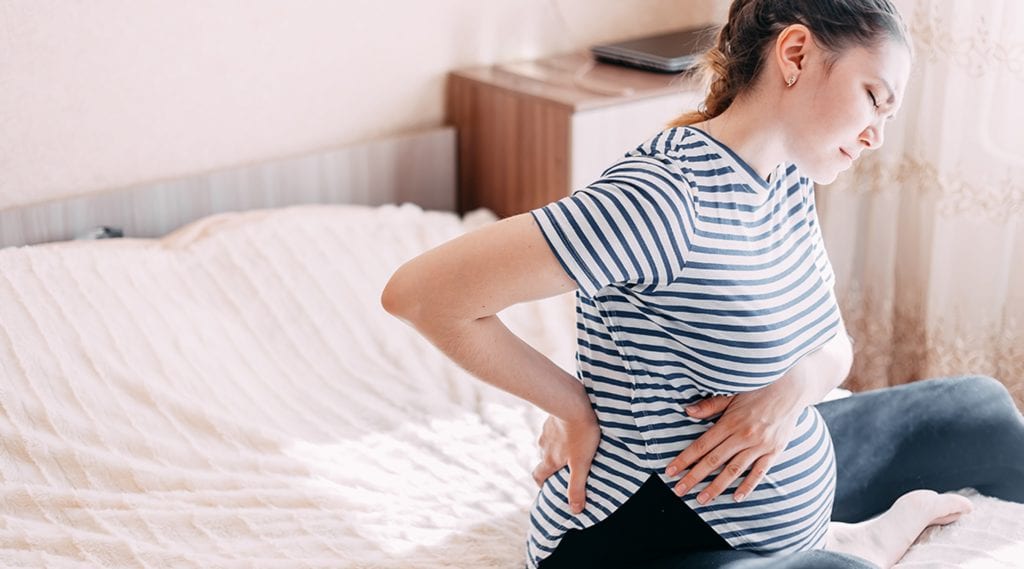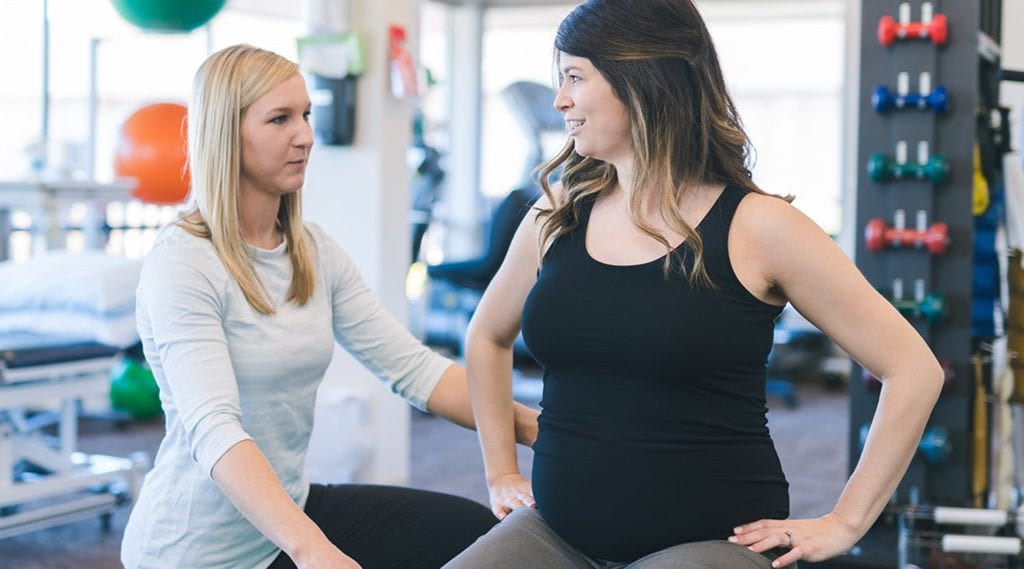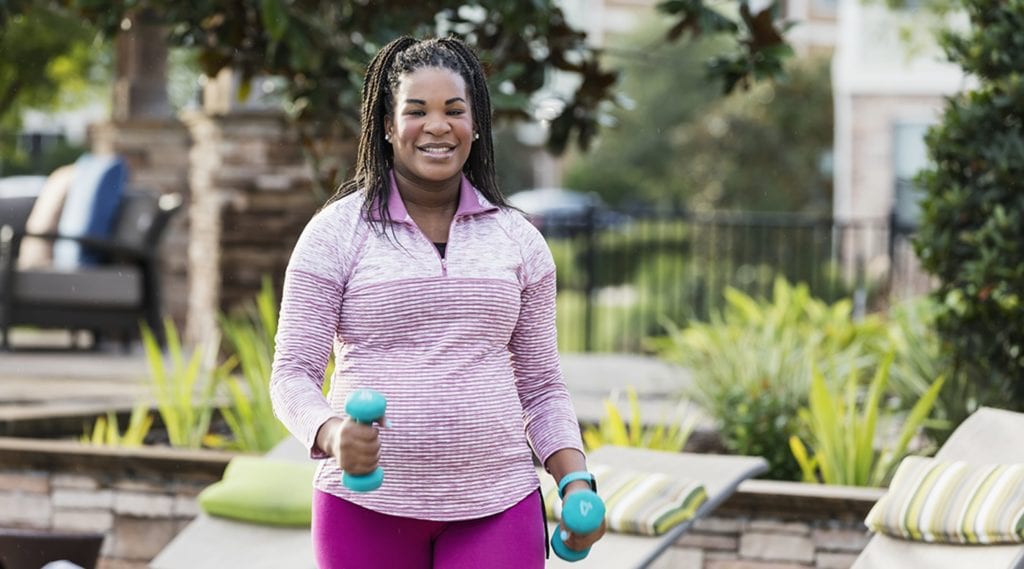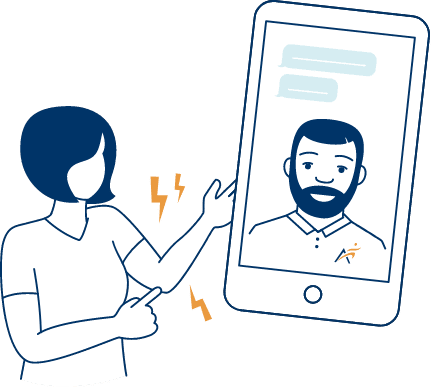(21,000+ reviews on Google across 150+ locations)
Airrosti’s Brooke Green, DC, discusses some of the common causes of prenatal and postpartum low back and hip pain. Find out how hormonal changes within the body can affect joint health during pregnancy and learn how different treatment methods approach pregnancy-related pain
Back pain during pregnancy can range from mild pain associated with specific activities to more acute or chronic pain that persists throughout the day. Pain most often occurs between the fifth and seventh month of pregnancy; however, low back pain can begin as early as 8 to 12 weeks after becoming pregnant and continue after delivery.

Back pain during and after pregnancy is a common concern, often stemming from lumbar (low back) and posterior pelvic (hip) discomfort. This can be attributed to various pregnancy-related factors, including weight changes, hormonal changes, weakened abdominal muscles, and poor posture. Additionally, not getting enough physical activity throughout the day can factor into back pain worsening.
Lumbar pain during pregnancy typically presents at and above the waistline, centered in the back, or on one or both sides of the spine. This discomfort tends to intensify during activities like bending, lifting, or prolonged sitting and standing.
Sciatica is a common condition during pregnancy and can stem from your ligaments loosening due to hormonal changes, as well as your uterus growing. Both can lead to your center of gravity shifting and cause the sciatic nerve to be pinched or compressed. Additionally, your baby’s weight or position may put pressure on the sciatic nerve. Sciatica is commonly felt in the third trimester of pregnancy but can happen at any time.
Symptoms include:
Another cause of discomfort in the lower back, hips, and pelvic region may be sacroiliac (SI) joint pain. This pain can occur due to hormonal changes, increased weight, and shifts in posture, placing stress on the SI joint which is connected to the pelvis. Symptoms may include sharp or dull pain in the lower back, buttocks, and thighs, exacerbated by activities like standing, walking, or changing positions.
Neck pain during pregnancy can stem from various factors caused by bodily changes experienced during this time. As the uterus grows and the body’s center of gravity shifts forward, your posture can worsen and place strain on the neck muscles and joints. Additionally, hormonal changes can cause ligaments to relax and increase joint mobility, potentially contributing to discomfort in the neck area.
The physical and emotional demands of pregnancy can also lead to increased stress levels and muscle tension, which may induce neck pain. Changes in sleep posture, such as sleeping on your back or using multiple pillows for support, may further strain the neck muscles. Moreover, the increased weight of the breasts and abdomen can alter body alignment, potentially adding to neck discomfort.
Postpartum neck pain can arise from constantly carrying your child, as well as hunching over to nurse, change, or play with them. These causes may lead to rounded and strained shoulders, as well as a forward jutting head. This poor posture can cause neck pain, as well as increase muscular imbalances in the affected areas.
Hip and groin pain are common discomforts during pregnancy, often felt as posterior pelvic pain deep within the hips and waistline. This pain can extend into the glutes and upper thighs and may be present on one or both sides. Additionally, pregnant individuals may experience round ligament pain, caused by the stretching of ligaments supporting the uterus.
Unlike some pregnancy-related pains, such as round ligament pain, posterior pelvic pain may not resolve with rest and can cause morning stiffness. The growing uterus and hormonal changes increase pressure on the pelvic area, contributing to discomfort and stiffness. As the body prepares for childbirth, pelvic ligaments may relax further, potentially worsening hip and groin pain.
Chronic pelvic and low back pain during pregnancy can also be a sign of Pubic Symphysis Dysfunction (SPD). This condition occurs when the ligaments in your hip joints loosen, causing your pelvis to widen and become unbalanced, which can lead to stiffness or pain in the pelvis.
Pubic Symphysis Dysfunction occurs frequently in pregnant women. While it is not medically harmful to your baby, it can leave you in severe chronic pain and affect your mobility. You may experience increased pain and/or discomfort from simple activities like walking or going up and down the stairs.
It is important to note that labor pain is a different type of pain. The pain can be located throughout the low back but most often it is associated with abdominal cramping and/or pain. It often has the following characteristics: the pain, increases in intensity and frequency over a short period of time, it is not affected by your level of activity, and it is difficult to find any position of relief. This is not the pregnancy-related low back/hip pain
Airrosti can have an impact on or treat. If you are unsure if the pain you are experiencing is in fact labor pain, please contact your healthcare provider immediately.
*Disclaimer: While some discomfort during pregnancy is normal, periods of prolonged or intense pain could be a sign of an underlying condition. It’s important to maintain open communication with your doctor and health care team about what activities you can reasonably do during and after pregnancy to help minimize any potential risks.

Traditionally, pregnant women suffering from back pain had few treatment options due to the significant risks involved with common treatment options like pharmaceuticals, injections, and imaging tests. Most available options may offer only partial and temporary relief from the pain.
Pregnancy back pain treatment options may include:

Any pregnancy-related pain that lasts longer than six to eight weeks should be treated to avoid chronic back pain or recurring back problems. Chronic lower back pain during pregnancy that lasts for weeks to months is a common predictor for postpartum back pain. For this reason, pregnant women are often encouraged to seek appropriate treatment during pregnancy.
However, even after childbirth, you may not be out of the woods quite yet. Postpartum, you may experience residual aches and pains or develop new conditions from parenthood, such as postural changes leading to upper back pain.
Airrosti offers noninvasive and highly effective treatment for low back and hip pain. Our Providers diagnose and design a treatment plan to help resolve pain at the source and help improve soft tissue and joint strength, mobility, and stability. Furthermore, we also provide tools and resources to continue your recovery at home and minimize the risk of future injuries.
If you or someone you know has been struggling with pregnancy/postpartum-related hip or low back pain and need some relief, schedule an appointment with an Airrosti Provider today, either in-clinic or virtual. To learn more about treatment with Airrosti, click here or give us a call at (800) 404-6050.
All Airrosti treatment provided during pregnancy is co-managed with your prenatal care provider. Your Airrosti Provider will work closely with your prenatal care provider to ensure you receive the best, most comprehensive care during your pregnancy.
Reviewed by Casey Crisp, Doctor of Chiropractic
Disclaimer: Always consult with your doctor before starting any exercise program. If you experience any numbness, tingling or reproduction of your symptoms, please contact your doctor.

I am in shock! This was my first time working with Airrosti, and it was amazing! If you had told me a few weeks ago that I would be pain free in two days I would have laughed. I was in so much pain for a month I went to urgent care was given muscle relaxers and Motrin to relieve the pain and be able to play with my twins. I thought I had sciatic nerve pain with twins but it turned out to be a sprain. Within two days after treatment and easy-to-follow exercises at home, here I am without pain. I wasn’t even able to walk at a point. I am completely grateful and for sure come back if needed!
by Celia Aranda
